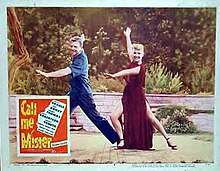Call Me Mister (film)
Call Me Mister is a 1951 American Technicolor musical film released by Twentieth Century-Fox. The feature was directed by Lloyd Bacon and re-written from the 1946 Broadway play version by Albert E. Lewin and Burt Styler with music by Harold Rome that featured cast members from the US armed forces.
| Call Me Mister | |
|---|---|
 Betty Grable and Dan Dailey on a Call Me Mister lobby card. | |
| Directed by | Lloyd Bacon |
| Produced by | Fred Kohlmar |
| Written by | Harold Rome Arnold M. Auerbach Burt Styler |
| Based on | Call Me Mister 1946 musical by Albert E. Lewin |
| Starring | Betty Grable Dan Dailey |
| Music by | Leigh Harline |
| Cinematography | Arthur E. Arling |
| Edited by | Louis R. Loeffler |
| Distributed by | Twentieth Century-Fox |
Release date |
|
Running time | 96 minutes |
| Language | English |
| Box office | $2,175,000 (US rentals)[1][2] |
Call Me Mister was filmed in Technicolor, and starred Betty Grable and Dan Dailey and co-starred Danny Thomas with supporting players Dale Robertson, Benay Venuta, and Richard Boone. Only a couple Harold Rome numbers were kept in the film.[3]
Background
The film was a film version of the Broadway version of Call Me Mister, but was also changed to be a remake of Betty Grable's 1941 film A Yank in the RAF. It was one of Grable's final "successful" films as her box-office power was beginning to diminish. This was also Grable's final film with Dan Dailey, with whom she co-starred in several of her previous films. Call Me Mister was a "moderate success" at the box-office.
The finale is a production number of "Love Is Back in Business" staged by Busby Berkeley, ending with four leading players on a precarious, high-rising disc surrounded by water fountains. Benay Venuta is replaced by a lookalike in the same clothes for this. Asked in the 1970s about it, she explained, "Betty Grable said, ‘I’m the star. I gotta do it.’ Dan Dailey was so drunk he didn’t care what he was doing. Danny Thomas said, ‘I’m on the way up. I gotta do it.’ Well, I didn’t gotta do it."
Plot
After the end of World War II American soldiers in occupied Japan are entertained with a show put on by one of their own Sergeant Shep Dooley (Dan Dailey) and his former wife who is an entertainer Kay Hudson (Betty Grable).
Cast
- Betty Grable as Kay Hudson
- Dan Dailey as Sergeant Shep Dooley
- Danny Thomas as P.F.C. Stanley Poppoplis
- Dale Robertson as Captain Johnny Comstock
- Benay Venuta as Billie Barton
- Richard Boone as Mess Sergeant
- Jeffrey Hunter as the Kid
- Frank Fontaine as First Sergeant
- The Dunhill Trio as Dancers
Soundtrack
- Call Me Mister
- Written by Harold Rome
- Performed by chorus during credits
- Reprised by Betty Grable and Dan Dailey
- Japanese Girl Like 'Merican Boy
- Written by Sammy Fain
- Lyrics by Mack Gordon
- Sung and danced by Betty Grable and chorus
- I'm Gonna Love That Guy Like He's Never Been Loved Before
- Written by Frances Ash
- Performed by Betty Grable and male chorus
- Lament to the Pots and Pans
- Written by Earl K. Brent
- Lyrics by Jerry Seelen
- Performed by Danny Thomas
- Goin' Home Train
- Written by Harold Rome
- Performed by Bobby Short and male chorus
- I Just Can't Do Enough for You, Baby
- Written by Sammy Fain
- Lyrics by Mack Gordon
- Performed by Betty Grable and Dan Dailey
- Military Life
- Written by Harold Rome
- Revised lyrics by Jerry Seelen
- Performed by Danny Thomas
- Love is Back in Business
- Written by Sammy Fain
- Lyrics by Mack Gordon
- Performed by Betty Grable, Dan Dailey, Benay Venuta, and Danny Thomas
References
- 'The Top Box Office Hits of 1951', Variety, January 2, 1952
- Aubrey Solomon, Twentieth Century-Fox: A Corporate and Financial History Rowman & Littlefield, 2002 p 223
- http://www.allmusic.com/album/call-me-mister-mw0001002059
External links
| Wikimedia Commons has media related to Call Me Mister (film). |
- Call Me Mister on IMDb
- Call Me Mister at AllMovie
- Call Me Mister at the TCM Movie Database
- Call Me Mister at the American Film Institute Catalog